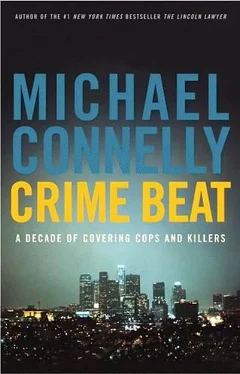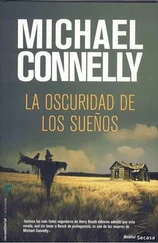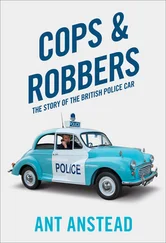Gladys started counting the days left until her retirement from her office job in two years. That would be when she would put her house up for sale and move away from South Florida. But, still, at night, she would lie awake in bed and listen… She would return from outings, unlock the door, stand there and listen…
Often when home alone, she found herself asking, did I just hear a noise out there or is it my imagination? The legacy of fear that Billy Schroeder left behind will remain with her always, she says.
Billy Schroeder could have gotten away. On one job, in North Dade, he hit the jackpot – a pile of jewelry that he converted to bags of cash and crack.
“I ended up with $20,000 cash in my hands,” he recalls. “I said to my girlfriend, ‘Let’s get out of here. I have the money now, let’s go to a rehab center and get off this.’ ”
They decided on New Jersey, even got the airline tickets. But on the way to the airport, Billy and his girlfriend went to a friend’s house to say good-bye. And they celebrated the good-bye with one more rock. Within a few hours Billy checked into a Hilton suite with a bag full of rocks. Within days the jackpot money was gone.
Schroeder wouldn’t get another chance to get away. His habit was growing and costing him close to $1,000a day. He was breaking into more homes each day and the risks were getting greater while he was getting sloppier. He even stopped wearing his phony FPL uniform.
On Feb. 26, 1987, Davie Police got a call about a possible burglary in process. Officers went to the home and saw an open window, and a screen leaning against the outside wall. The screen was the giveaway. A few minutes later the cops entered the house and found a burglar hiding in a bathroom shower stall. He said his name was William Burns.
As the Davie officers were booking the burglar into the county jail, a sheriff ’s deputy booking his own prisoner looked over at Burns and recognized him as the man on the wanted fliers Detective Cloud had been circulating for almost a year.
“You’re not William Burns,” the deputy said, and the long crime spree of Billy Schroeder was over.
The copswho wanted to speak to Schroeder had to take turns. It took two days for the elusive burglar to come out of his cocaine intoxication and figure out he was in jail, but when he did, he considered his lot – the fingerprints, the evidence, his past record – and simply said, “Let’s go. I want it behind me.”
Schroeder sat handcuffed and shackled in the backseats of several detectives’ cars as they drove through neighborhoods of South Florida. It took him three weeks to go over the territory, pointing out the houses he remembered being in. The detectives matched Schroeder’s recollections against their own burglary reports. All told, Cloud says they cleared close to 350burglaries. And there are perhaps dozens of others Schroeder can’t remember.
Of the millions of dollars in property that Schroeder stole, nothing was recovered. “It’s gone forever,” Cloud says.
Schroeder was charged with 13 burglaries. (It would take years to prosecute him if he were charged in all his burglaries.) On May 21, he tearfully pleaded guilty to the charges in a plea agreement that could leave him facing as many as 20years in prison.
“I want to get this behind me,” he told the judge. “I have to look to the future.”
While waiting for that future, he has been kept in the east wing of the North Broward Detention Complex, home to all inmates undergoing drug counseling and detoxification. Schroeder takes part in the jail’s “New Life” programs, works in the laundry and volunteers to speak to visiting groups of teenagers about the dangers of drugs.
He seems resigned to a lengthy stint in prison. And he seems genuinely repentant. Still, he can only gain by this contrition and therefore his sincerity is open to question.
But he cries when he talks about the time more than a year ago that he smoked that first rock. And he cries when he talks about the families he stole from. He says maybe someday he will make restitution, a possibility that is, in reality, laughable.
“I just want to do something,” he says. “I think about all the families I robbed and I know I’ve got to do something for them.”
Like many a jail inmate, Schroeder says he has got Jesus with him now. He tries to keep his sleeve over the “Get High” tattoo and regrets the day he got it. He says he wants another chance. That’s the bottom line: another chance. But deep down, he knows it might be too late for Billy Schroeder.
“I’m hoping to someday get another shot at society,” he says. “I don’t want to be thrown completely away.”
Billy Schroeder turned his back on society but now hopes it won’t do the same to him. He seeks sympathy for the devil, so to speak. But it is hard to come by.
“I like Billy Schroeder,” says Detective Bill Cloud. “But I have no sympathy for him. I have sympathy for the people he stole from. They have to put up with the feelings of intrusion and their losses for the rest of their lives. They worked all their lives so they can have some of these possessions, and somebody breaks in and it’s all gone.”
Those sentiments are echoed like the clanging of a jail door: “He was destroying people with what he did,” Detective Dermot Mangan says. “He has got to pay something for that.”
“It’s sad,” says burglary victim Gladys Jones. “Sure the kid needs help. But the people he hurt also need something. When I think of what I’ve been through and that I’m only one of the hundreds of people he did this to, I still feel very angry and hurt.”
Lawyer Norman Elliott Kent, who was appointed to defend Schroeder after he confessed to his crimes, declines to use pat arguments like drugs made Schroeder do it, he’s a product of his environment, he deserves a break and so on. Much of that is valid, but somewhere along the line Billy Schroeder made a choice. There is responsibility somewhere.
“Billy was a drug addict and drug money burns quickly,” Kent says. “And for all that he managed to steal, there is nothing left but hurt victims and a troubled defendant. All Billy has to show for it is his empty pockets, his drug addiction and a jail term. If there is a lesson in all of this, that is it: to let people know what can happen. His message is that in the end everybody loses.”
It’s morning in the east wing and a small group of high school students are gathered in the multi-purpose room for a tour of the jail. With all the banging of the heavy doors, sharp clacking of electronic locks and echoes bouncing off the steel and concrete, the students have to lean forward to hear the speaker.
The speaker is an inmate here, a young man with a prematurely aged face. He is here to tell them that he is a loser who found out how to win, how to make it the right way too late. Don’t be like me, he wants to tell them.
“Hello, my name is Bill,” he begins. “And I’m a drug abuser.
“I started doing drugs when I was 11 years old. And pretty soon after that I started going through people’s windows. I hurt a lot of people. And here I am…”
AMBUSH SHOOTING
Nurse killed trying to aid man on street.
LOS ANGELES TIMES
February 23, 1989
A private nurse who stopped her car in the hills above Studio City and apparently got out to help a man lying in the street was fatally shot Wednesday when the man stood up and pulled a gun, Los Angeles police said.
No arrest was made in the ambush killing of 40-yearold Lucille Marie Warren at Montcalm Avenue and Woodrow Wilson Drive in an exclusive neighborhood of hillside homes.
Warren was shot at 6:45a.m. while on her way home to Inglewood, police said. She had left a house on Montcalm where she worked as a night nurse.
Читать дальше












